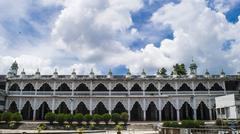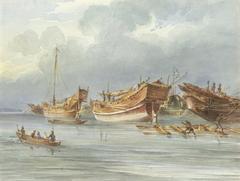Baitul Falah Mosque Chittagong: Visiting Hours, Tickets, and Complete Guide
Date: 04/07/2025
Introduction
Baitul Falah Mosque, also known as Jamiatul Falah Mosque, is the largest mosque in Chittagong, Bangladesh. Renowned for its architectural grandeur and deep cultural roots, it serves as both a spiritual sanctuary and a vital community center. This guide provides detailed information on the mosque’s history, architectural features, visiting hours, entry policies, accessibility, etiquette, and nearby attractions, ensuring an insightful and respectful visit to one of Chittagong’s most prominent landmarks (Jamiatul Falah Mosque; Chittagong’s historic growth centres and urban landscape).
Historical and Cultural Context
Chittagong’s Urban Heritage
Chittagong’s urban fabric is a tapestry of historical trade, religious diversity, and evolving city planning. Its growth has been shaped by strategic geography—nestled between the Bay of Bengal and the Karnaphuli River—and by centuries of religious coexistence. Architectural legacies from the Sultanate and Colonial periods established traditions of building large religious complexes that blend worship, education, and community functions (Chittagong’s historic growth centres and urban landscape).
Emergence of Baitul Falah Mosque
Strategically located near WASA Square, Baitul Falah Mosque accommodates approximately 5,000 worshippers inside and up to 50,000 in its open grounds during major festivals. Built on accessible, elevated land, it continues the city’s tradition of constructing religious spaces that double as community hubs (Jamiatul Falah Mosque).
Architectural Features
Design and Regional Influence
The mosque’s architecture harmoniously blends traditional Islamic motifs with local Bangladeshi elements. Earthy tones, understated elegance, and use of locally sourced materials like brick and stone give the mosque a serene and grounded aesthetic (bestinteriordesign.com.bd). Elements such as high ceilings, intricately decorated mihrab and minbar, and geometric calligraphy reflect both regional and Islamic design principles.
Structural Layout
- Prayer Hall: Expansive, unobstructed, with clear sightlines to the mihrab.
- Courtyard: Serves as overflow space for large congregations and a transitional area for reflection.
- Minarets & Dome: Prominent features that balance functionality for the call to prayer with architectural beauty.
- Natural Light: Large windows and latticework allow filtered sunlight, creating a tranquil atmosphere.
Modern Innovations
The mosque incorporates sustainable practices—natural ventilation, energy-efficient lighting, and water-saving facilities—while discreetly integrating modern amenities such as sound systems and climate control (bestinteriordesign.com.bd).
Accessibility & Community Spaces
The design includes ramps, wide entrances, and designated areas for women and families. Additional facilities like classrooms and meeting spaces support the mosque’s educational and social role.
Religious and Community Significance
Baitul Falah is central to Chittagong’s Muslim life, hosting daily prayers, Friday Jumu’ah, and major religious festivals like Eid al-Fitr and Eid al-Adha. Its eidgah (open-air prayer ground) is one of the largest in the city, drawing worshippers from across the region. The mosque also organizes Quranic classes, religious lectures, charity drives, and educational initiatives, making it a hub for spiritual, social, and civic engagement (HalalTrip; ExploreCity).
Visitor Information
Location & Accessibility
- Address: South of WASA Square, central Chittagong.
- Transport: Easily accessible by bus, taxi, rickshaw, and CNG three-wheelers. Shah Amanat International Airport is about 15-20 minutes away by car (WildTrips).
- Parking: Limited onsite; public transport is recommended.
Visiting Hours
- Daily: 5:00 AM – 9:00 PM (Some resources mention 6:00 AM as opening; check locally for updates)
- Best Times: Early mornings and late afternoons during weekdays for a tranquil experience. Fridays and Eid holidays are busiest.
Entry & Tickets
- Entry Fee: Free for all visitors; no tickets required.
- Guided Tours: Occasional tours available during festivals or upon request; local guides often provide informal tours.
Dress Code & Etiquette
- Dress Modestly: Men should wear long trousers and shirts with sleeves; women should cover arms, legs, and hair with a scarf.
- Shoes: Must be removed before entering prayer halls; racks are provided.
- Behavior: Maintain silence, respect worshippers, and avoid visiting during peak prayer times unless participating.
- Photography: Permitted in exterior and courtyard areas; seek permission before photographing interiors or worshippers.
Facilities
- Ablution & Restrooms: Clean, separate for men and women.
- Gardens: Shaded areas for quiet reflection.
- Accessibility: Ground floor and gardens are accessible; upper floors may lack ramps or elevators.
- Nearby Eateries: Local restaurants and tea stalls nearby; no food vendors inside mosque grounds.
Safety and Security
The mosque is well-maintained and secure, overseen by the Chittagong City Corporation and located near the Dampara Police Line. Large crowds are common during special events; visitors should remain attentive to personal belongings and follow local authorities’ guidance (WildTrips).
Nearby Historical Sites and Attractions
- Garibullah Shah Shrine: Revered Sufi site within walking distance.
- Chandanpura Mosque: Known for colorful domes and unique architecture (TrekZone).
- Ethnological Museum: Offers insights into Bangladesh’s diverse communities.
- Foy’s Lake: Popular for boating and outdoor recreation.
- Baizid Bostami Shrine: Another major religious landmark.
Exploring these sites alongside Baitul Falah enriches your understanding of Chittagong’s heritage.
Practical Tips
- Language: Bengali is primary; basic English is understood by many locals.
- Footwear: Bring a bag for your shoes.
- Hydration: Carry bottled water, especially in warmer months.
- Photography: Always ask before photographing people or interiors.
- Respect: Keep conversations quiet and avoid eating or drinking in mosque areas.
Frequently Asked Questions (FAQ)
Q: What are the visiting hours?
A: Open daily from 5:00 AM to 9:00 PM; hours may vary during holidays and special events.
Q: Is entry free?
A: Yes, there is no admission fee.
Q: Are non-Muslims welcome?
A: Yes, especially outside main prayer times.
Q: Is the mosque accessible for people with disabilities?
A: The ground floor and gardens are accessible; upper levels may have limited access.
Q: Are guided tours available?
A: Formal tours are rare, but local guides are often willing to share information.
Q: Is photography allowed?
A: Allowed in exterior areas; seek permission for interiors or photographing people.
Visual Resources
Find high-quality images and virtual tours of Baitul Falah Mosque on official tourism and travel websites, using search terms like “Baitul Falah Mosque Chittagong Exterior” and “Baitul Falah Mosque Prayer Hall Interior” for the best results.
Conclusion and Recommendations
Baitul Falah Mosque is both a spiritual beacon and a cultural landmark, offering a window into Chittagong’s Islamic heritage and community life. Its welcoming atmosphere, free entry, and central location make it accessible for all visitors. For a peaceful visit, plan to arrive outside peak prayer times, and explore nearby historical attractions to gain a deeper appreciation for the city’s history.
For more travel tips, updates, and audio guides, download the Audiala app and follow us on social media. Whether you are seeking spiritual solace, architectural inspiration, or cultural enrichment, Baitul Falah Mosque is an essential stop in Chittagong.
Sources and Further Reading
- Jamiatul Falah Mosque
- Chittagong’s historic growth centres and urban landscape
- HalalTrip: Chittagong City Guide
- ExploreCity: Chittagong Attractions
- Priobangla: Baitul Falah Mosque Details
- bestinteriordesign.com.bd: Mosque Interior Design in Bangladesh
- WildTrips: Chittagong – What to Visit
- ScriptureSavvy: Things to Do in Chittagong
- TrekZone: Chittagong Mosques

